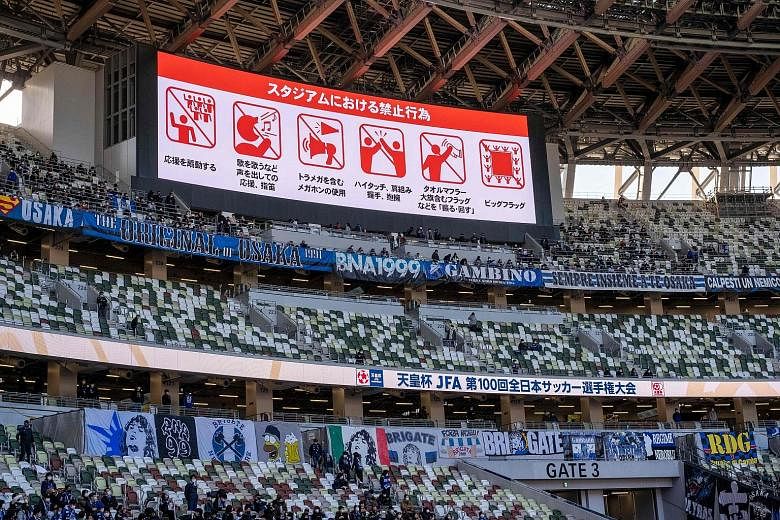TOKYO • Japan yesterday stood firm on its commitment to host the Tokyo Olympics this year, denying reports of a possible cancellation but the pledge looks unlikely to ease public concern about holding the quadrennial event during the coronavirus pandemic.
Though much of Japan is under a second state of emergency due to a third wave of Covid-19 infections, the Tokyo 2020 organisers have vowed to press ahead with the rescheduled Games, which are due to open on July 23.
A government spokesman said there was "no truth" to an earlier report in The Times of London that officials had privately concluded the Games would have to be cancelled because of the virus.
The newspaper, citing an unidentified senior member of the ruling coalition, said that the government's focus was now on securing the Games for Tokyo in the next available year, 2032, but the story has been refuted.
"We will clearly deny the report," Deputy Chief Cabinet Secretary Manabu Sakai told a news conference yesterday.
Prime Minister Yoshihide Suga said he was "determined" to hold the Games, while Tokyo Governor Yuriko Koike noted there had been no talk of cancelling or delaying the Olympics and a protest should be lodged over the Times report.
The Games organising committee also denied the report, saying its partners including the Japanese government and the International Olympic Committee (IOC) were "fully focused" on hosting the Games as scheduled.
"It is very disappointing to see that the Times is developing such a tabloid-like story with an untrustworthy source," a source told Reuters.
"The national government is fully committed to delivering a safe and secure Games, and we are always encouraged by their dedications."
Later, Japan Olympic Committee head Yasuhiro Yamashita told Reuters the report was false and "a fabrication".
The IOC was on the same page as Tokyo 2020 organisers, with vice-president and chair of the Tokyo coordination commission John Coates shooting down reports suggesting that Japan is looking for a way out.
Referencing The Times' story, the Australian said: "There has been no discussion on cancellation. At the end of the day, politicians do have to take into account the feelings of those inside their party and the general public.
"But this is not the message we are getting from Prime Minister Suga or Tokyo Organising Committee president Yoshiro Mori, himself a former prime minister."
But despite all the denials, Mr Sakai admitted that a decision was looming for Japan. "At some point in time, we will naturally make a decision as to whether to actually hold it," he said. "Until then, the Japanese government will do what it needs to do and make progress and prepare for it."
A decision may come by March, when Japan is set to hold the Olympic Torch Relay.
That was also the month the year-long delay was announced last year, even before Japan declared its first state of emergency.
The end of March also marks the start of final preparations, according to Tokyo 2020's road map, moving to a "Games-time" structure, test events and the arrival of athletes. A failure to exit the current state of emergency will complicate planning and pressure officials to make some tough decisions.
While Japan's emergency is currently set to run until Feb 7, it could be extended, and Japan's top virus adviser Shigeru Omi has said it may last until April.
New virus variants, like the UK strain, has already led to tighter border restrictions and could complicate the arrival of athletes.
The testing regime, quarantine procedures and securing of hospital space for potential participant infections may also be impacted if cases remain high despite the emergency restrictions.
Meanwhile, the Australian and US Olympic Committees have said that they will continue to prepare for the Games as planned unless told otherwise.
Tokyo reported new daily coronavirus cases of more than 1,000 for 10 straight days till yesterday and set a single-day record of more than 2,400 infections earlier this month and there are fears an influx of over 15,000 foreign athletes will spread the virus.
Recent opinion polls show about 80 per cent of respondents do not want the Games to be held in Japan this summer.
Still, Tokyo 2020 chief executive officer Toshiro Muto is placing his faith in the vaccine roll-out that is currently under way in other countries will go some way towards assuaging public concerns.
"Once vaccinations are conducted widely in the US and Europe, I think there is no doubt that it will have a positive effect (on the Olympics)," he added.
"As vaccinations are conducted to some extent, I expect public opinion will get generally relieved. And I think there is a possibility that it makes it easier to hold the Games."
Taro Kono, newly installed head of Japan's inoculation push, said yesterday the country, with a population of 126 million, is preparing to start vaccination in late February.
AGENCE FRANCE-PRESSE, BLOOMBERG, REUTERS

